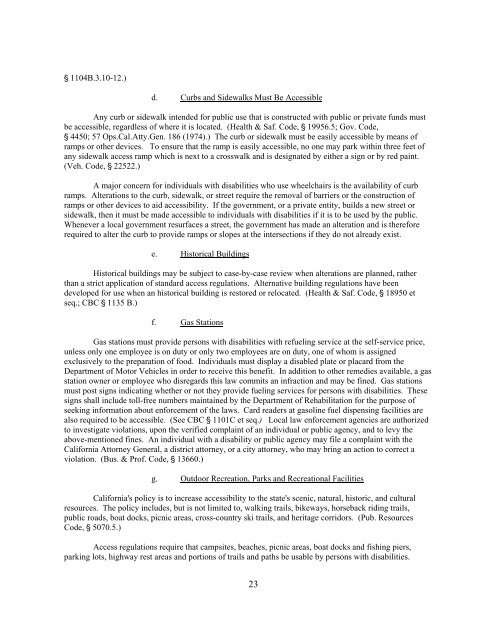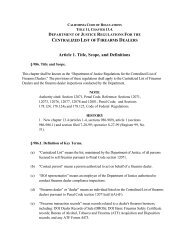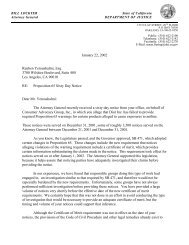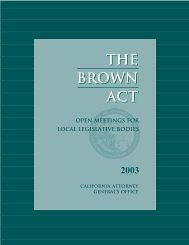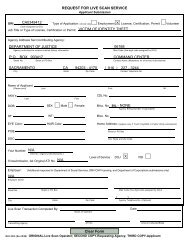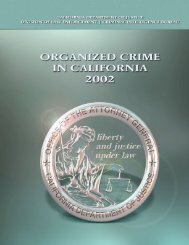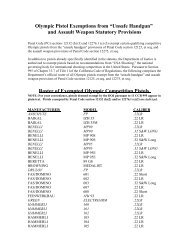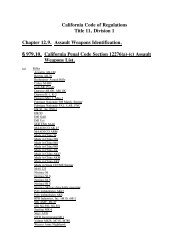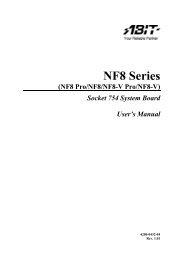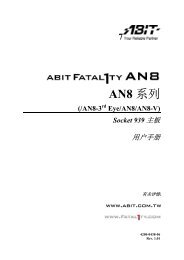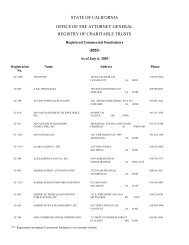Legal Rights of Persons With Disabilities - Ossh.com
Legal Rights of Persons With Disabilities - Ossh.com
Legal Rights of Persons With Disabilities - Ossh.com
Create successful ePaper yourself
Turn your PDF publications into a flip-book with our unique Google optimized e-Paper software.
' 1104B.3.10-12.)<br />
d. Curbs and Sidewalks Must Be Accessible<br />
Any curb or sidewalk intended for public use that is constructed with public or private funds must<br />
be accessible, regardless <strong>of</strong> where it is located. (Health & Saf. Code, ' 19956.5; Gov. Code,<br />
' 4450; 57 Ops.Cal.Atty.Gen. 186 (1974).) The curb or sidewalk must be easily accessible by means <strong>of</strong><br />
ramps or other devices. To ensure that the ramp is easily accessible, no one may park within three feet <strong>of</strong><br />
any sidewalk access ramp which is next to a crosswalk and is designated by either a sign or by red paint.<br />
(Veh. Code, ' 22522.)<br />
A major concern for individuals with disabilities who use wheelchairs is the availability <strong>of</strong> curb<br />
ramps. Alterations to the curb, sidewalk, or street require the removal <strong>of</strong> barriers or the construction <strong>of</strong><br />
ramps or other devices to aid accessibility. If the government, or a private entity, builds a new street or<br />
sidewalk, then it must be made accessible to individuals with disabilities if it is to be used by the public.<br />
Whenever a local government resurfaces a street, the government has made an alteration and is therefore<br />
required to alter the curb to provide ramps or slopes at the intersections if they do not already exist.<br />
e. Historical Buildings<br />
Historical buildings may be subject to case-by-case review when alterations are planned, rather<br />
than a strict application <strong>of</strong> standard access regulations. Alternative building regulations have been<br />
developed for use when an historical building is restored or relocated. (Health & Saf. Code, ' 18950 et<br />
seq.; CBC ' 1135 B.)<br />
f. Gas Stations<br />
Gas stations must provide persons with disabilities with refueling service at the self-service price,<br />
unless only one employee is on duty or only two employees are on duty, one <strong>of</strong> whom is assigned<br />
exclusively to the preparation <strong>of</strong> food. Individuals must display a disabled plate or placard from the<br />
Department <strong>of</strong> Motor Vehicles in order to receive this benefit. In addition to other remedies available, a gas<br />
station owner or employee who disregards this law <strong>com</strong>mits an infraction and may be fined. Gas stations<br />
must post signs indicating whether or not they provide fueling services for persons with disabilities. These<br />
signs shall include toll-free numbers maintained by the Department <strong>of</strong> Rehabilitation for the purpose <strong>of</strong><br />
seeking information about enforcement <strong>of</strong> the laws. Card readers at gasoline fuel dispensing facilities are<br />
also required to be accessible. (See CBC ' 1101C et seq.) Local law enforcement agencies are authorized<br />
to investigate violations, upon the verified <strong>com</strong>plaint <strong>of</strong> an individual or public agency, and to levy the<br />
above-mentioned fines. An individual with a disability or public agency may file a <strong>com</strong>plaint with the<br />
California Attorney General, a district attorney, or a city attorney, who may bring an action to correct a<br />
violation. (Bus. & Pr<strong>of</strong>. Code, ' 13660.)<br />
g. Outdoor Recreation, Parks and Recreational Facilities<br />
California's policy is to increase accessibility to the state's scenic, natural, historic, and cultural<br />
resources. The policy includes, but is not limited to, walking trails, bikeways, horseback riding trails,<br />
public roads, boat docks, picnic areas, cross-country ski trails, and heritage corridors. (Pub. Resources<br />
Code, ' 5070.5.)<br />
Access regulations require that campsites, beaches, picnic areas, boat docks and fishing piers,<br />
parking lots, highway rest areas and portions <strong>of</strong> trails and paths be usable by persons with disabilities.<br />
23


